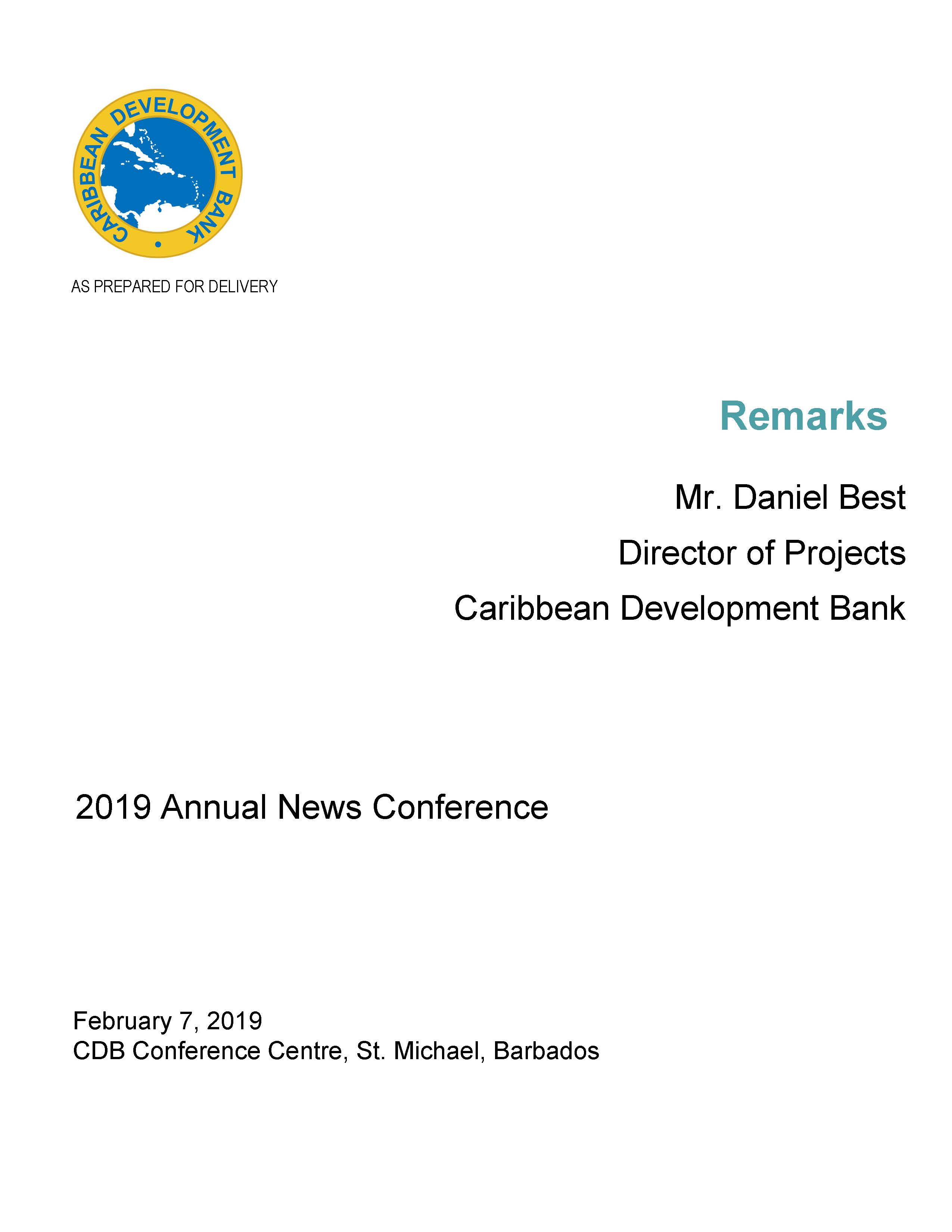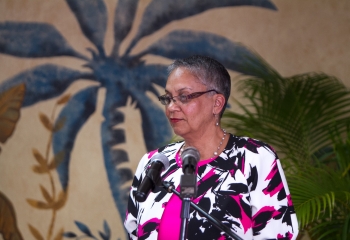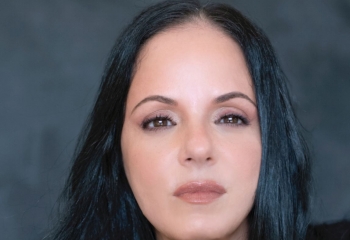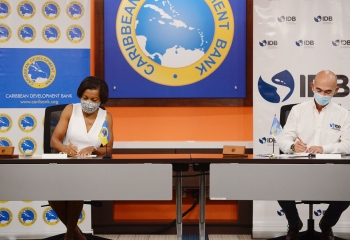2019 Annual News Conference- Mr. Daniel Best
St. Michael
Barbados

Members of the Media;
Management and Staff of CDB;
Viewers tuning in online;
Good morning
The President has given an overview of the Bank’s operational performance in 2018, against the backdrop of a focus on resilience and transformation.
This morning I will spend the next few minutes looking specifically at highlights of key projects approved and under implementation in 2018, with an emphasis on how our investments are transforming the lives of Caribbean people.
A major step towards delivering results was exemplified in the 20% increase in disbursements over the 2017 period. This significant improvement results from a combination of two factors. First is our continued investment in the training of public officers to assist our BMCs to implement projects faster. Second is the Bank’s ongoing review of its policies and procedures to improve our responsiveness.
Underpinned by the imperative of the Sustainable Development Goals, we continued to invest in critical economic and social infrastructure. In this regard, we funded the construction of roads that gave communities better access to key services. We made our roads safer, and supported the reconstruction and rehabilitation efforts in BMCs hardest hit by the 2017 Hurricane Season.
We approved a loan of USD40.4 million to upgrade infrastructure and services at the Grantley Adams International Airport (GAIA) in Barbados. This project will improve the quality of infrastructure; enhance institutional capacity; and reduce energy consumption from existing pavement lighting at the Airport.
The Government of Belize will benefit from a loan of USD36.6 million and a grant of GBP25 million to upgrade the Coastal Highway. These funds will be used to improve climate resilience along the entire road, and increase connectivity between the southern and northern sections of Belize. The Project is designed to have a transformative impact on nearby communities by reducing travel time, improving access to services such as health care and education, and boosting economic development.
Road-traffic accidents are the seventh leading cause of death in Belize, with an estimated 21 deaths per 100,000 people. This is the highest fatality rate among CDB’s BMCs. To address this issue, the Bank approved funding of USD5.9 million to the Government of Belize, to support critical efforts to improve road safety. The project will incorporate a multi-sectoral approach, focusing on changing behaviour by increasing awareness and understanding of risks, and improving traffic law enforcement and post-crash response.
Through the United Kingdom Caribbean Infrastructure Partnership Fund (UKCIF), the Bank approved a Grant of GBP974,000 to the Government of Jamaica to prepare a feasibility and design study for the development of an agriculture project for communities in the parishes of St. Catherine and Clarendon. The feasibility study will boost capacity for the development of designs and plans, laying the foundation for the appraisal of a project to include an irrigation system and associated production and marketing systems.
Delivering Development Results
I now wish to give you a snapshot of our results as it relates to implementation in key areas, namely road transportation, reconstruction and rehabilitation, and education.
Road Transportation
In Belize, the first road safety project ended. Over the implementation period of six years, road fatalities on a demonstration corridor between Belize City and the capital, Belmopan, fell dramatically from a pre-project average of 33 per year to less than 8, representing over 150 lives saved and 1,500 serious injuries avoided.
In Guyana, we completed the USD44 million Fourth Road Project, upgrading 31km of road in West Coast Demerara. Over 100,000 people are now benefiting from the upgraded and safer infrastructure, which includes a wider corridor; improved drainage; and new pedestrian and bicycle lanes to accommodate vulnerable road users.
Also in Guyana, the Sea and River Defense Resilience Project advanced significantly. Specifically, on Leguan Island, located in the Essequibo River, the emergency works carried out have ensured flood protection for the 4,000 residents.
Reconstruction and Rehabilitation
Following Hurricanes Irma and Maria, CDB approved rehabilitation and reconstruction loans for Anguilla and Dominica to support the restoration of their electricity transmission and distribution systems. Based on reports from the Anguilla Electricity Company, all 8,100 customers have been reconnected to the grid. In Dominica, the restoration of service is progressing well with 28,000 or 82% of customers reconnected in 2018.
Energy Security
Earlier the President mentioned our ongoing investments in energy efficiency and smart grids in The Bahamas. Antigua and Barbuda and Jamaica successfully replaced some 44,000 street lights with energy-efficient light-emitting diode (LED) lighting, significantly reducing their carbon footprint.
Education
We continued our support for the implementation of the CARICOM Human Resource Development Strategy through training for almost 1,500 principals, teachers and instructors. Now educators across the Region are better equipped to deliver technical and vocational education and training, special needs education, competency-based education and training, psychosocial services, and health and family life education.
Through the Basic Needs Trust Fund, the Bank’s flagship poverty reduction programme, students at all stages benefitted from:
- the rehabilitation of existing pre-primary and early childhood development centres;
- the construction of facilities that increased access to remedial education and early childhood development; and
- new school furniture, ICT technology, supplies and other equipment that enhanced the learning environment.
In addition, the Bank provided training in early childhood development for more than 100 teachers, across Guyana, and Saint Lucia— offering much-needed support for children at one of the most critical stages of education.
Through our private sector development programmes, the Bank invested in Micro, Small and Medium-sized Enterprise (MSME) development by providing credit to MSMEs in various sectors, including agriculture, manufacturing, tourism and services.
Furthermore, CDB focused on enhancing the operational capacity of MSMEs and on building resilience in its BMCs. 719 business owners across the Region benefitted from just under USD$1 million in technical assistance.
The Bank gave special attention to building capacity in women-owned MSMEs and business support organisations in 10 BMCs through Caribbean Export’s WE-XPORT programme.
The Bank awarded contracts totalling US$76.5 million in 2018. An estimated US60 million (80%) was awarded to regional firms. Over the past five years, the Bank awarded a total of US$358 million in contracts, with over 85% going to regional firms. In practical terms, this means employment for regional consultants, tradesmen and women.
Looking ahead to 2019
The Bank will continue to deliver on our commitment to fast-track the implementation of projects, by placing greater emphasis on supervision.
We anticipate that this will be enhanced by the nearly 3,500 public officers who benefitted from the training in Public Policy Analysis and Management and Project Cycle Management programmes in our BMCs.
Allow me to give you just a snapshot of projects we propose to put before our Board of Directors for consideration this year.
In 2019, we expect to complete appraisal of:
- a US$37 million project to the Government of Suriname to continue the upgrade and expansion of the electricity system
- a US$12 million project for the upgrade of the Sir Arthur Lewis Community College and to meet Special Education Needs in St. Lucia, and
- a US$10 million project for the enhancement of TVET in Haiti.
Through grant resources from the UK’s Caribbean Infrastructure Fund, technical assistance is underway to prepare a number of projects for financing. These include the proposed upgrading of the Philip S. W. Goldson Highway in Belize; the Loubiere to Bagatelle Road in Dominica; and the Western Road Corridor in Grenada. A water upgrading project in Grenada and the construction of a new port in Kingstown, St. Vincent and the Grenadines are also proposed. These projects will amount to some US$96 million.
The projects and plans I have outlined today demonstrate the Bank’s unwavering commitment to being more responsive to its BMCs while transforming the lives of Caribbean people, especially the most vulnerable in our societies.
As a Region, we will continue to work tirelessly until poverty is eradicated and sustainable development is achieved.




